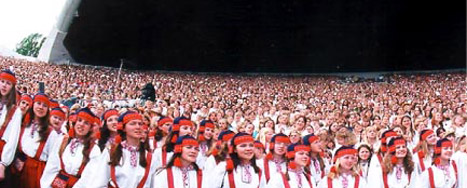The sound of freedom...
Looking back over the last thousand years or so Estonia hasn't had the best of luck. A relatively small country with a similarly small population, it could have chosen better neighbours than the Scandinavians, Germans and Russians, all of whom have claimed Estonia as their own through the ages.
A tantalizing taste of freedom in the period between WWI and WWII, proved to be short-lived as in 1945 the plucky nation found itself under foreign rule once more, this time as part of the USSR. Despite resistance, some of it armed, Soviet rule continued for nearly half a century, before a unique movement helped throw off the Socialist yoke. That movement was the Estonian Singing Revolution.
"We sang all night and everybody went home early in the morning. It was emotionally so strong that the next day there were even more people. The day after, there were even more people. People took out their hidden flags. They had these flags hidden for 50 years and now they took these out and started to wave them."
Artur Talvik, participant.

The Revolution started in the summer of 1987, when mass protests by the Estonian people began against Russian occupation of their country. In the June evenings of that year over 10,000 people a night packed the Lauluvljak (The Tallinn Song Festival Grounds), where they sang patriotic and national songs forbidden by the Soviet regime. These gatherings helped unite the Estonian people and ignited a renewed wave of passion for their national identity (which was being marginalised by aggressive Russification of the country), furthering the country's desire for freedom. In September of 1988, 300,000 Estonians gathered at the Lauluvaljak to continue their protest and to hear Trivimi Velliste make the first public demand for independence.
Meanwhile, similar calls for freedom were being made by Estonia's Baltic neighbours, Lithuania and Latvia (see Latvian Song Festival for more info), whilst in Berlin students were calling for the fall of the Berlin Wall, and in Poland, the Solidarity movement was re-emerging from the underground.
Back in the Baltics, on 23rd August 1989, a vast and impressive demonstration was staged. Two million people from Estonia, Latvia and Lithuania joined hands along a 600km stretch of road between Tallinn, Riga and Vilnius. This powerful and public statement against Russian rule was deliberately timed to to mark the 50th anniversary of the Molotov-Ribbentrop pact, in which Hitler and Stalin had seen fit to divide up Europe between them.
The years from 1987 to 1991 were filled with numerous such public demonstrations, as well as a great deal of political maneuvrings, the sum of which is known as the Singing Revolution. On 20th August 1991 Estonian politicians declared the nation's independence even as Soviet tanks were rolling through the countryside to quell the movement. However, the bid was successful, and several key events mark the following days:
August 21 - Latvia declares independence.
August 22 - Iceland is the first country to recognize the independent Baltic states.
August 23 - Lenin's statue comes down in Tallinn.
August 24 - The USSR recognizes Estonian independence.
By December of 1991 the USSR had dissolved.
For a more recent story on the influence of song in Estonia, click on our page about the Eurovision Song Contest
Comments
It's good I guess haven't read
ReplyI have used this video in part for 6th graders to understand the influence music can have. I show it 5 or 6 times during the school year and have yet to hold back the tears. Powerful!
ReplyI'm a 79 years old man who seldom shows tears, but when I watched the Singing Revolution last night I couldn't hold them back. That you could,and did, gain freedom through song and nonviolence is almost unbelievable, but you did it.
ReplySaw the movie Singing Revolution last night. 8/18/08. A very moving movie depicting the struggle of the Estonian people for FREEDOM. Everyone in America, or any democratic society, should see this movie. Then perhaps people will better understand and appreciate living in a free and democratic county really means As a people they were amazingly brave. Not sure we in this country still have that type of spirit? A must see!!!!!!!!!!
Reply"This is definitely one of the most incredible political uprisings in history. Being Baltic,in America, my amazement was multiplied."
ReplyHello, I saw something that I thought was quite relevant to this page and I thought it would not hurt to post it here... There is a documentary coming out about Estonia's Singing Revolution: http://singingrevolution.com sam
Reply